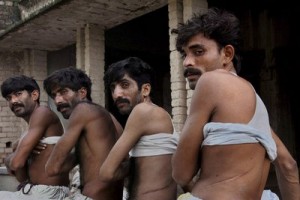Imagine living in poverty. You are your household’s main breadwinner. You are married and have four children who are all under the age of 18 and are depending on you to meet their most basic needs: shelter, food and clothing. You have the opportunity to go to another country to work. They will pay you in a week what you make in three months back home. You say goodbye to your loved ones and get in a bus with five other men, who are also ready to make the journey. When you arrive at your destination, you find that you’ve been tricked. You are not there to work, but to give one of your kidneys to be sold to the highest bidder in the black market. You don’t know exactly where you are; you are scared; and you need to bring money back home.  You don’t see a choice and undergo this risky and unwanted surgery. You’ve been victimized, but are you a victim of human trafficking?
You don’t see a choice and undergo this risky and unwanted surgery. You’ve been victimized, but are you a victim of human trafficking?
I recently met with international visitors from Latin America, who were sponsored by the U.S State Department to learn more on our anti-human trafficking initiatives. We had a very productive afternoon exchanging ideas and brainstorming on strategies for the future. Then came the inevitable question that when answered always brings a shake of the head and incredulous look: “What about the trafficking of organs? You’ve failed to mention how you deal with those situations.” Then, I have to explain that under U.S federal law, the trafficking of organs is not considered human trafficking.
The reason that people look at me in disbelief, is that most countries have developed anti-trafficking laws that mirror the United Nations protocols against modern day slavery. The UN regulations are broader than those enacted by the United States and include the illegal harvesting and selling of organs as a form of human trafficking. U.S law is much narrower and defines human trafficking as a scenario that has to have two main components: restriction of movement and labor.
Does the story at the beginning show that this person was held and forced to work against their will? We definitely see the psychological restriction of movement in the fear that kept him from leaving. However, do we see the labor?
This is a continuing point of contention between traditional anti-trafficking advocates and a new group of activists who are trying to create protections for those who are forced into selling their organs. There is a group that argues that selling a body part does not constitute work; therefore, the labor component in current trafficking legislation is void. Others state that a commercial transaction has taken place as these men and women were compensated for their body part.
So should organ trafficking be included in human trafficking legislation?
I have previously mentioned in past blogs that the reauthorization of the Trafficking Victim Protection Act (TVPA) of 2000 is coming up. Past reauthorizations addressed the needs of previously unprotected populations. These included American children who were initiated into the sex trade and in 2005, the plight of child soldiers was included. Now is the time that changes can be made. While some are advocating adding this issue to the list of areas that need to be addressed, others are talking about creating a completely separate law to tackle organ trafficking.
For example, a Florida Republican Congresswoman spoke of creating a comparable law to the TVPA to address trafficking in organs. This law would assist victims, arrest and prosecute traffickers and aim to raise awareness against on the cause. But is that the answer? A parallel law would allow flexibility to address issues that solely pertain to this topic. The law wouldn’t have to be molded to fit the existing trafficking statutes. However, if added to the existing laws, organ trafficking victims would receive all the benefits of the existing law and the corresponding funding.
There are many items and areas of concern that need to be resolved. Stakeholders need to meet and discuss how to implement programs, allocate funding and mandate the enforcement of laws. I do think though that first and foremost, we need to be able to answer to following question, is the trafficking of organs, human trafficking? Without that answer, nothing else matters.
Regina Bernadin is a doctoral student at Nova Southeastern University focusing on Conflict Analysis and Resolution. As a SISGI Group intern, her primary areas of interest are conflict resolution, human rights and Latin American political, economic and socio-cultural issues. Her interest in the development of human rights abroad has taken her to several Latin American countries, including Colombia, Ecuador and Suriname.

